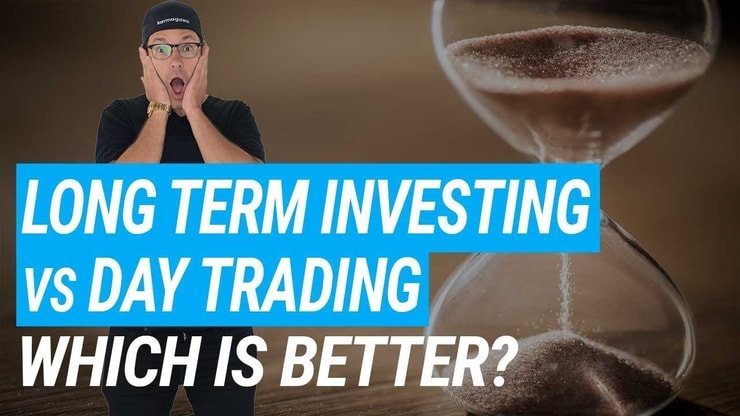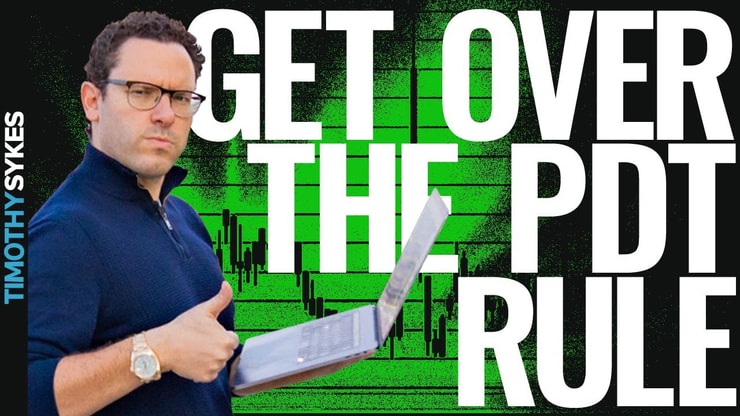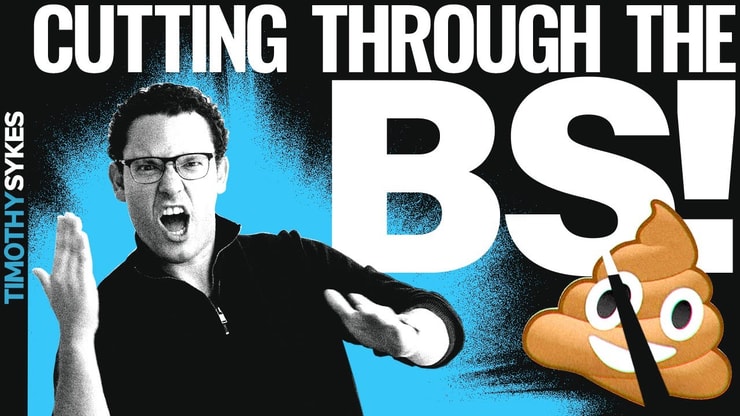As a day trader, lots of people ask me, “Is day trading illegal?”
Of course not. That’s a myth.
There are many myths about day trading floating around. I’ll try to clear some of those up in this post.
My goal as a teacher and trader is to be as transparent as possible. I want more traders to understand what day trading is. And I want them to know that you can learn to trade with the rules and a process.
Myths can hold people back. So if you’re asking ‘is day trading illegal’ … read on. I’ll do my best to help you see through the BS.
Table of Contents
What Is Day Trading?

Trader jargon for opening and closing a position is a ‘round trip.’ When a trader completes a round trip within a single trading day, we call that a day trade.
It’s not considered a day trade if someone decides to hold a position overnight, even if they exit the position first thing the next morning.
When a position is held overnight or longer, it’s a swing trade, investment, or maybe a position trade.
Is Day Trading Illegal?

It’s a common misconception that day trading is illegal. I’m living proof that’s not true.
I’ve been day trading for over 20 years now. I’ve seen lots of illegal things related to the stock market, but day trading isn’t one of them.
Some people have the impression that day trading is illegal because they’ve seen reports of day traders having their accounts restricted. But that’s usually because those traders have broken some rules. I’ll get to those rules in a bit…
The big issue with day trading — or any type of trading, for that matter — is that people get into it with insufficient knowledge. They don’t study. So they just buy and sell stocks based on gut feelings, then watch their accounts get wiped out.
I’ve seen it too many times to count. That’s why I take my Trading Challenge so seriously. It’s where I help traders understand the stock market better. My students learn to make trades based on strategy not gut feelings.
If you’re serious about finding your way in the markets, consider applying for the Challenge. You’ll get access to thousands of video lessons, live webinars, DVDs, and arguably the best trading chat room around.
I teach students everything I’ve learned in my trading experience so they find strategies that work for them.
If you’re ready to work your butt off, apply for the Challenge NOW.
What Is the Pattern Day Trader Rule?

The pattern day trader (PDT) rule is easily the most discussed rule among day traders…
It says pattern day traders must maintain a minimum account balance of $25,000. So, what’s a pattern day trader?
It’s any trader with a margin account who makes four or more day trades within a rolling five-day period. The key here is margin account. Traders with cash accounts don’t have to worry about the PDT rule.
It’s also important to note that it says four or more day trades, not just four or more trades. If a trader holds a position overnight, it doesn’t count toward the PDT rule.
Let’s break it up for those with accounts under and over $25,000 so we can discuss the nitty-gritty…
Day Trading Rules Under $25K
Anyone who wants to day trade with less than $25,000 needs to understand the PDT rule. Otherwise, they might see their account restricted for 90 days and miss out on some great opportunities.
For those with cash accounts, there’s no need to worry about the PDT. However, all funds need to be settled before any trades are placed. You can’t trade with unsettled funds, or you could find your account restricted.
For those with margin accounts, make sure to stay within the limits of three day trades in a rolling five-day period.
There are ways around the PDT rule, like opening multiple brokerage accounts or using an offshore brokerage — but I don’t think those are necessarily good ideas.
When I started trading, I didn’t like the PDT rule. But now, after 10+ years of teaching, I see how it protects traders. It’s like resistance training for newbies. It’s an incentive for them to study hard, have patience, and maximize every trade.
I love to see that as a teacher. I want traders to study hard and hit those big milestones — like my first female millionaire Challenge student, Mariana.
(*Please note that Mariana’s trading results are not typical. Most traders lose money. Individual results will vary. Trading is inherently risky. Before making any trades, remember to do your due diligence and never risk more than you can afford to lose.)
Day Trading Rules Over $25K
Once a trader gets their account over $25,000, they should do everything they can to stay there. In my opinion, it’s the best way to get around the PDT rule.
My #1 rule for all traders is to cut losses quickly. It sucks to blow up your account no matter how big it is. But it’s devastating when a trader finally gets over $25,000 and then blows up their account because they failed to follow my #1 rule.
Want to learn more about my rules? Check out the 30-Day Bootcamp I set up with one of my top former Challenge students, Matthew Monaco. He’s up hundreds of thousands of dollars in profits since recording the Bootcamp videos with me back in April 2020.*
(*Note that these results aren’t typical. Top traders like Matt and I put in the time and dedication and have exceptional skills and knowledge. Most traders lose money. Always remember trading is risky … never risk more than you can afford. I’ve also hired Matt to assist me in my education business.)
Now let’s go over some day trading myths so you can easily answer the question ‘is day trading illegal’…
Is Day Trading Illegal? 4 Day Trading Myths You Shouldn’t Believe
You’ve probably heard at least one of these at some point. Let’s cut through the BS…
More Breaking News
- SunOpta’s Acquisition Boosts Stock by 32% Amid Key Industry Moves
- Redfin’s ChatGPT Integration Enhances Home Search, Boosts Rocket Companies’ Market Presence
- TRX Gold Shines with Strong Q1 Earnings and Raised Price Targets
- MNTS Stock Surges Amid Strategic Expansion and Financial Insights
Is Day Trading Illegal Myth #1: Day Trading Is Very Stressful
This is one of the most common myths. I want to put an end to it. The truth is, anything can be stressful if you make it stressful. That’s why you need to understand the stock market before getting into it.
I’m a super conservative trader. I usually have a relatively small position size, and I only trade when an opportunity is too good to pass up. Let me put it like this: I like to think that I’m in retirement and only come out when I have to.
Anyone can trade conservatively like I do. Learning the patterns and how to adapt to the stock market can help take the stress out of day trading. You don’t have to trade all day every day.
Check out my Trading Mastery all-day live sessions. It’s how you can get access to trade alongside me, see how I trade, and watch how I protect my account in the most volatile markets.
Is Day Trading Illegal Myth #2: You Need a Lot of Money to Day Trade
Don’t believe anyone who says you need a lot of money to day trade…
Tim Grittani started in my Trading Challenge years ago with $1,500. Now he’s a chat room moderator who’s made over $13 million thanks to trading.* He’s an exceptional trader and proof you don’t need a lot of money to start day trading.
I tell students to start with less than they think they should because learning to trade is hard. Expect to lose in your early market days. Might as well start small then, right?
Is Day Trading Illegal Myth #3: Day Trading Creates Millionaires
This statement isn’t completely false … but whether day traders can become millionaires depends a lot on how dedicated they are.
Are you willing to devote thousands and thousands of hours to studying? Would you watch the same trading DVDs again and again like many top traders? Will you have the discipline to follow the rules? Can you remain humble after small successes?
These are all questions you should ask yourself if you think you’re serious about day trading.
Day trading is tough. Too many people expect it to result in easy money. That’s not the case. It takes constant hard work and dedication.
Is Day Trading Illegal Myth #4: You’ll Make Money After You Learn the Basics
This is a big-time myth. Learning the basics can help set traders up for better results in the future…
… but past performance doesn’t guarantee future results.
Even if someone learned the basics and did well in the past, that’s not evidence that they’ll continue to do well.
Traders need to continually adapt to the market. They need to build a watchlist every day. They need to study stock charts so they can see what’s working and what’s not.
That’s why I consider myself a glorified history teacher. I don’t stop studying and teaching from past stock charts. Studying the past helps me prepare for the future.
Frequently Asked Questions
How Many Trades Can You Make in a Day?
There’s no limit to how many trades someone can make in a day — unless they’re under the PDT. If you have over $25,000 in your account, there’s no limit to how many trades you can make. Even then, it’s not smart to overtrade. Only take advantage of the best opportunities for your trading style.
Can You Day Trade With Less Than $25K?
Yes! Just make sure you’re following the PDT rule and using only trading your top setups. I’ve now seen several traders start in my Trading Challenge starting with small accounts then go on to achieve incredible milestones.*
Is Day Trading Illegal in Canada?
Day trading isn’t illegal in Canada. Canadian brokers are less strict with the PDT rule than most U.S. brokers, but some Canadian brokers follow the same rules as U.S. brokers. Always check your broker’s rules before getting started.
Why Is Day Trading Bad on Robinhood?
Day trading on Robinhood isn’t necessarily bad. Every broker comes with pros and cons. You can’t trade OTC stocks on Robinhood. For day traders who love the volatility in penny stocks (like me), that can be a big downside. Because when OTC stocks run, the opportunities can be amazing.
The Bottom Line: Is Day Trading Illegal?

The myth of ‘is day trading illegal’ has gotten into too many people’s heads. It’s false. Day trading is completely legal.
I think one reason is the PDT rule. There are ways around the PDT … but I think it’s ultimately good for traders. It can make you be more selective about your trades.
In my opinion, it’s far better to work hard and slowly build your account. When you see small gains add up, you appreciate it more.
What do you think? How do you respond when someone asks ‘is day trading illegal?’ Let me know in the comments.












Leave a reply